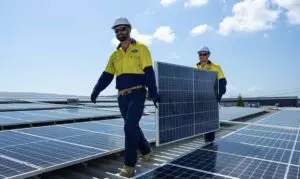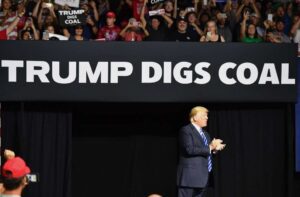Australia’s Capital Territory should introduce electric vehicle adoption targets and policy incentives, to help fast-track the transition to low-emissions transport, and maintain its position as a global and national climate policy leader, a new report has recommended.
The 120-page report – tabled in the ACT parliament on Thursday by the Commissioner for Sustainability and the Environment Dr Kate Auty – charts the progress of the Territory’s emissions reduction and renewable energy targets, and sets out a framework of recommendations for the next round of climate policy development.
The report notes that the ACT is on track to reach 100 per cent renewable electricity well ahead of its 2020 target, thanks to its use of reverse auctions, a Renewable Energy Innovation Fund, its partnership with industry, and the adoption of a Next Generation Battery Storage program.
But while this has helped to take a big chunk out of the ACT’s overall emissions reduction task – it is aiming for a 40 per cent reduction on 1990 levels by 2020, and zero net emissions by 2050 – there is still work to be done; and much of it, says Auty, in the national capital’s transport sector.
“Transport is the biggest climate change mitigation challenge for the ACT and significant commitment to policy development, action and targets will be central to the ACT continuing its reputation as a climate change policy leader and driver of change,” says the report.
“By 2020 (the transport) sector will contribute about 60 per cent of the total emissions in the ACT. Passenger vehicles are the biggest proportion of transport sector emissions constituting about 75 per cent.”
To fast-track the uptake of electric cars in Canberra, the Commission recommends introducing a target for electric vehicles in the ACT to clearly guide the market – such as 500 EVs in the ACT by 2020.
It also proposes the introduction or enhancement of financial incentives for EVs, such as free parking and use of transit lanes; and tax incentives like salary sacrifice or fringe benefits tax concessions.
The report also suggests that the ACT government sets out a clear plan to transition its own car fleet to EVs and to invest in infrastructure to support this. And to boost private market uptake, it recommends canvassing “bulk buy options” for electric vehicles and possibly e-bikes.
But the report also notes that the ACT is not an island, and that some factors – namely the embarrassingly slow and low up-take of electric vehicles nationally – are beyond its control.
“Even though take-up of electric vehicle technology is escalating (some suggest exponentially) it is recognised that the industry is still several years away from being able to deliver significant transitional change,” the report says.
A major factor behind this lag in Australia’s EV uptake has been put down to the lack of national incentives and/or other policies, which in turn has stifled demand, which in turn has worked to severely limit the number of EVs being sold on the Australian market.
That was the conclusion of a separate report, released earlier this month by The Australia Institute that called on all of Australia’s governments – federal and state – to “learn from the successes of other countries” and introduce policy incentives to support electric vehicle adoption.
That report – titled If you build it, they will charge: Sparking Australia’s electric vehicle boom – noted that the Turnbull government currently had “no serious policy measures in place to curb emissions from Australia’s transport sector,” despite it being the third-largest contributor to national greenhouse gas emissions, and despite the promise of “financial and environmental benefits (that) will flow” from mass EV uptake.
“All up, with their potential to reduce air pollution in urban areas, curb carbon emissions from electricity and the transport fleet, save consumers money and improve vehicle safety standards, electric vehicles should be an easy sell in Australia,” the report says.
But, if the federal government won’t take this advice, perhaps the ACT will. According to Dr Evan Franklin – a senior research fellow at Australian National University Research School of Engineering and a contributor to the ACT report – the Capital Territory is particularly well placed to harness the EV revolution.
“Canberra is blessed with all the right ingredients,” Franklin writes in the report. “It has a strong and efficient electrical distribution network which will be able to accommodate a well-planned transition to electrified transport.
“The same network is, at least in part, responsible for the lowest retail electricity prices in Australia, which makes ‘filling up the tank’ of an electric vehicle markedly cheaper than anywhere else.
Franklin also points to the territory’s compact urban population, “where short stop/start car trips are the norm and the type of operation where electric vehicles perform at their best.”
Finally, he notes, “as a society, Canberra is well-educated and progressive, with an above-average means to be early adopters, and hence become early beneficiaries of this technology.
“The benefits to the ACT of an early transition to electrified transport will be significant. In terms of climate policy outcomes the case certainly should not be understated.”
And to this extent, at least, the ACT government appears to agree.
“The Commissioner’s focus on the transport sector is appropriate as it will be the largest contributor to emissions from 2020 onwards,” said the Territory’s minister for climate and sustainability, Shane Rattenbury, in a statement on Thursday.
“With the majority of transport emissions coming from private car travel, cars will soon become Canberra’s single biggest producer of greenhouse gas emissions. It’s essential that we improve the movement of people around our city, especially by increasing public transport and active travel, and reducing reliance on private car travel.”
Rattenbury noted that the ACT had already ensured that its light rail network was powered by renewable electricity, and was trialing electric buses, which it hoped to roll out throughout its transport system. But he said his government would take on board Auty’s recommendations as it developed future policy.
“I look forward to tabling the ACT Government’s response to the report early next year,” he said.









